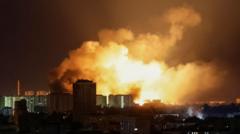Following President Trump lifting sanctions against Syria and supporting its new leadership, Israeli military actions in the region have drastically decreased. This comes amid a backdrop of Israel's long-standing efforts to counter threats from Syria, highlighting the challenges and adjustments faced by Israeli leadership under shifting U.S. foreign policy.
Shift in U.S. Policy Toward Syria Alters Israel's Military Operations

Shift in U.S. Policy Toward Syria Alters Israel's Military Operations
President Trump's recent decision to engage with Syria complicates Israel's defensive strategies in the region.
Israel has launched over 700 attacks on Syria since the fall of dictator Bashar al-Assad, mostly aimed at curtailing potential threats from hostile groups. These actions reflect a historic approach driven by the experience of conflict in southern Lebanon, which informs Israel's ongoing military strategy. Israeli officials have consistently characterized the current Syrian regime, led by President Ahmed al-Shara—an Islamist faction formerly associated with Al Qaeda—as an extremist threat.
However, this longstanding pattern of military engagement has dramatically altered following President Trump’s recent diplomatic outreach to Syria. In a move that breaks from decades of American policy in the region, Trump praised al-Shara's leadership and expressed optimism about the possibility of stability in Syria, which has been ravaged by civil war since 2011.
The American president's commitment to lifting sanctions was publicly dealt just days after an Israeli airstrike near Damascus, which many saw as a demonstration of continued Israeli resolve. Yet, following Trump's May 14 meeting with al-Shara, Israeli airstrikes have significantly diminished, marking a potential end to one chapter of military operations as the dynamics on the ground evolve.
The developments have piqued interest in both Syrian and Israeli circles. Many Syrians, especially in regions like Aleppo, welcomed the lifting of sanctions, signaling a new phase of potential recovery. Meanwhile, Israeli officials are left to reassess their military strategies amid an increasingly complex geopolitical landscape where traditional allied relationships are being rewritten.
As Trump’s approach unfolds, the long-term implications on regional security, U.S.-Israeli relations, and the Syrian people's future remain uncertain. Balancing these interests will likely require strategic recalibrations by Israel to adapt to a shifting alliance and the rising hope for a stable regime in Syria, even while confronting an evolving threat environment.
However, this longstanding pattern of military engagement has dramatically altered following President Trump’s recent diplomatic outreach to Syria. In a move that breaks from decades of American policy in the region, Trump praised al-Shara's leadership and expressed optimism about the possibility of stability in Syria, which has been ravaged by civil war since 2011.
The American president's commitment to lifting sanctions was publicly dealt just days after an Israeli airstrike near Damascus, which many saw as a demonstration of continued Israeli resolve. Yet, following Trump's May 14 meeting with al-Shara, Israeli airstrikes have significantly diminished, marking a potential end to one chapter of military operations as the dynamics on the ground evolve.
The developments have piqued interest in both Syrian and Israeli circles. Many Syrians, especially in regions like Aleppo, welcomed the lifting of sanctions, signaling a new phase of potential recovery. Meanwhile, Israeli officials are left to reassess their military strategies amid an increasingly complex geopolitical landscape where traditional allied relationships are being rewritten.
As Trump’s approach unfolds, the long-term implications on regional security, U.S.-Israeli relations, and the Syrian people's future remain uncertain. Balancing these interests will likely require strategic recalibrations by Israel to adapt to a shifting alliance and the rising hope for a stable regime in Syria, even while confronting an evolving threat environment.




















